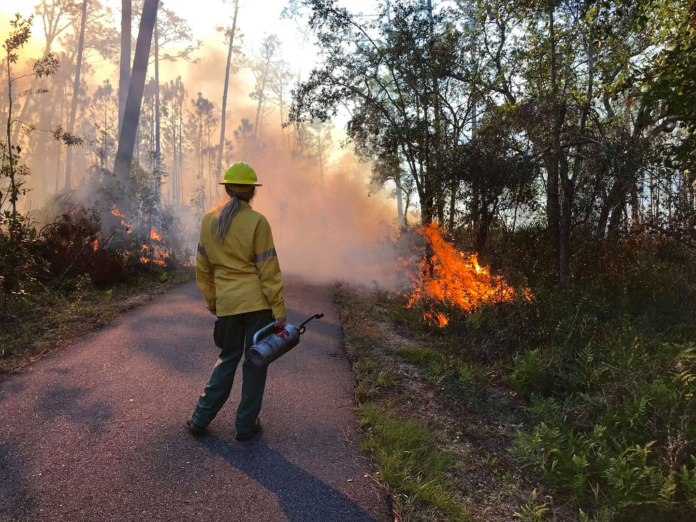
Smoke billows into the sky, visible to nearby residents and motorists as a sign that something is burning in the Alabama forest.
It’s a prescribed fire at Oak Mountain State Park, which sometimes causes alarm because the smoke can be seen from Interstate 65 or U.S. Highway 280, but it ultimately promotes a healthy forest and better recreational opportunities for park visitors.
“We want the public to know that there is such a thing as good fire,” said Tasha Simon, chief of the Natural Resources Section for the State Parks Division of the Alabama Department of Conservation and Natural Resources (ADCNR).
Prescribed fires, Simon said, accomplish a number of critical objectives.
“One of our objectives for using prescribed fire is to reduce excessive amounts of vegetative fuel on the ground and to decrease the risk of wildfire,” said Simon, who earned an Ecology and Evolutionary Biology degree from the University of West Florida. “Prescribed fire is also used as a tool to control or manage invasive species, to maintain biodiversity and to stimulate the growth of new vegetation. That growth serves as valuable food for deer and creates a nesting habitat for turkey and quail.”
Prescribed fire is an important land and wildlife management tool used to restore and improve natural habitats throughout Alabama’s State Park System. For example, a prescribed burn along the Talmadge Butler Boardwalk Trail at DeSoto State Park in Fort Payne was conducted in 2021 to reduce an area of dense vegetation. After the burn, more sunlight was able to reach the ground which encouraged the return of the lady slipper, a rare pink orchid, to the landscape.
Before a prescribed fire can occur, Simon must coordinate with various agencies to ensure the fire is properly managed. Specific weather conditions must also be present before it can start. For instance, one of the first prescribed burns of 2024 was scheduled for Cheaha State Park between Jan. 19 and March 1. An exact date of the fire could only be scheduled by evaluating numerous conditions, including critical weather factors.
Last year, unfavorable weather conditions caused officials to postpone a prescribed fire at Gulf State Park until 2024. Prescribed burns are also planned for DeSoto, Frank Jackson, Lakepoint, Lake Guntersville and Oak Mountain state parks this year.
Funding State Parks
Alabama State Parks rely on visitor fees and the support of other partners like local communities to fund most of its operations. That means the work performed by the State Parks Natural Resources Section depends on funding and manpower.
The State Parks Division budget is supplemented by revenues from Alabamians’ purchase of an Alabama State Parks car tag and personalized boat decals, which designates 80% of the tag’s cost to the State Parks System. This additional revenue stream helps fund management activities, such as prescribed fires.
“It’s important to remember that 100% of the day-to-day operational funding for our State Parks is generated by user fees for lodging, entrance, golf, campsites and other amenities paid by guests,” said Chris Blankenship, ADCNR Commissioner. “Every time someone chooses to buy a State Parks car tag or boat registration personalized decal it helps our conservation efforts. In fact, this revenue stream has become vital for our State Parks System to thrive. I have a State Parks tag on my truck!”
In addition, the Alabama State Parks Foundation, a non-profit organization, allows individuals and corporations to give directly to specific state parks or projects. Buffalo Rock Pepsi and the Alabama Power Foundation are two recent examples of the corporate support aiding the Alabama State Park System. Donations can be made online at https://asparksfoundation.org/give/.
Alabama State Parks Director Greg Lein said the additional revenue from car tag sales and the individual and corporate support provided through the Foundation are crucial to continued conservation efforts and other improvements within the State Parks System.
“We are grateful to everyone who has purchased a car tag or made a donation through the Foundation,” Lein said. “Their generous support helps us maintain and restore natural habitats within the parks as well as create new programs, features and amenities for parks visitors. Without this additional funding many of these improvements to our natural resources, trails and educational programs wouldn’t be possible.”
Conservation efforts
Prescribed fires at Alabama’s 21 State Parks often grab the public’s attention, but it’s far from Simon’s lone responsibility.
“We manage the land, water, soil, plants and animals of Alabama State Parks,” said Simon, who is in her eighth year with the State Parks System. “Our mission is to safeguard the natural habitat and encourage responsible stewardship. By doing so, we create a tranquil environment, offering our guests peaceful moments immersed in nature.”
Simon oversees the State Parks Division’s conservation efforts, which requires her to coordinate a wide variety of projects.
Some days require Simon to plan and execute prescribed fire. Other days are dedicated to managing efforts to control invasive species. She also works to secure grant funding, which paired with funding provided by car tag sales and the Alabama State Parks Foundation enhances and expands all these efforts.
Alabama’s state parks feature more than 50,000 acres of land and water, with parks in the foothills of the Appalachian Mountains, the sandy beaches along the Gulf of Mexico and all points in between. A State Park is located within a short drive of virtually every Alabamian.
Alabama is one of the most biologically diverse states in the country and Alabama’s State Parks System puts that biodiversity on full display – a significant reason why the parks welcome millions of visitors every year. Alabama residents and visitors can enjoy the gorgeous scenery available alongside the State Park System’s picturesque cabins, chalets and campgrounds. Reservations for overnight accommodations at Alabama State Parks can be made online at www.alapark.com.
Working for healthy state parks
The Natural Resources Section also promotes the restoration of native habitats and species within state parks, which includes managing invasive species.
A recent example of a successful public-private partnership to reduce invasive plant species comes from Chewacla State Park in Auburn, where the all-volunteer Chewacla Invasive Plant Working Group is working to control Chinese privet and tallowtree, thorny olive, wild taro, water hyacinth, kudzu and other non-native plants.
Simon helped secure a $20,000 Hearts of STIHL grant from STIHL, Inc., in 2022, which provided funding for the Chewacla Invasive Plant Working Group’s ongoing efforts. She also secured another grant from the Alabama Association of Resource Conservation and Development Councils to support placing pollinator gardens at 12 state parks around the state starting this year.
Additionally, Simon oversees lake management at Alabama State Parks, in conjunction with the ADCNR Wildlife and Freshwater Fisheries Division, where she plays a key role in fostering recreational fishing. This involves the preservation of suitable habitats, upkeep of water quality and efficient control of invasive species. Simon also coordinates fish stockings to bolster the lakes’ overall ecological balance. The aim of these efforts is to prevent population declines and support the long-term sustainability of the fisheries.
“These conservation efforts are required so that the natural habitats within our state parks can flourish,” Simon said. “The beauty of our parks system is sustained through these efforts and improves the experience for each visitor. The support of our partners and the public plays a vital role in allowing us to do this work.”




















